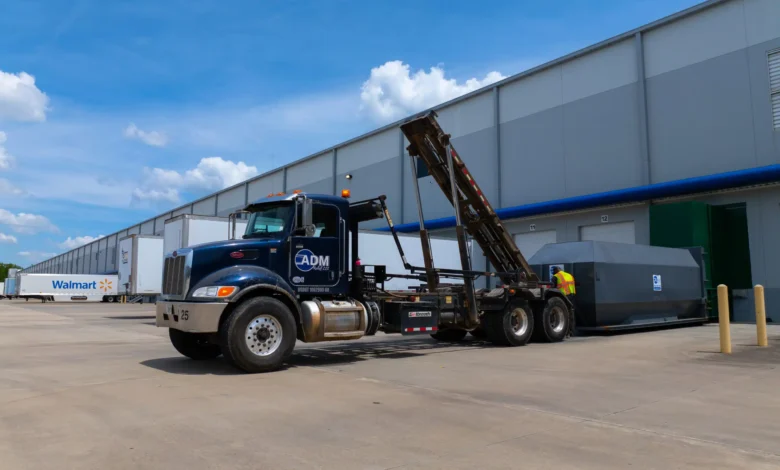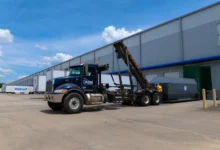Efficient Waste Management: Roll-off Dumpsters and Their Benefits

What Is a Roll-off Dumpster?
Roll-off dumpsters are large, open-top waste containers that are typically used for large-scale waste disposal projects such as construction, renovations, and clean-outs. These dumpsters are delivered to the project site on a special roll-off truck and can be rolled off the vehicle when the container is full. Utilizing roll-off dumpsters can greatly streamline waste management for such projects, making it easier to maintain a clean and organized work site. This effective equipment makes it possible to collect and dispose of waste in one convenient area, saving time and work. Consequently, roll-off dumpsters are commonly seen on construction sites, extensive home renovation projects, and community clean-up endeavors. Some companies even end up taking advantage of roll-off dumpster rental.
Common Uses of Roll-off Dumpsters
Because of their versatility, roll-off dumpsters can be utilized for many different things. Some common uses include:
- Construction debris removal: Managing the waste from construction sites efficiently by using roll-off dumpsters helps keep the work area safe and organized.
- Home renovation projects: Large home improvement projects generate significant waste that can be easily managed with a roll-off dumpster.
- Large-scale clean-outs: From garage clean-outs to clearing out basements, a roll-off dumpster is ideal for handling bulk waste.
- Yard waste removal: Landscaping projects and seasonal yard cleanings often result in large amounts of yard waste. A roll-off dumpster can hold branches, leaves, and other organic materials.
By utilizing a roll-off dumpster, individuals and businesses can efficiently handle different types of waste, promoting cleanliness and organization in their projects.
How to Choose the Right Roll-off Dumpster
Choosing the right roll-off dumpster depends on the type and volume of waste you need to dispose of. Here are a few factors to consider when selecting a roll-off dumpster:
- Size: Dumpsters come in various sizes, typically ranging from 10 to 40 cubic yards. Assess the amount of waste to determine the appropriate dumpster size.
- Type of Waste: Particular garbage kinds, such building debris or yard waste, are allocated different dumpsters. Ensure the dumpster you choose matches your waste type.
- Rental Period: Consider how long you’ll need the dumpster. Most rental services offer flexible rental periods to accommodate your project’s timeline.
You may choose the best dumpster for your needs and ensure cost-effectiveness and efficient garbage management by carefully weighing these variables.
Best Practices for Waste Management
Proper waste management can greatly lessen your environmental impact. Here are some best practices to follow:
- Segregate recyclable materials from general waste: To guarantee that recyclables are handled properly, create distinct bins for materials like paper, plastic, and metal.
- Dispose of hazardous materials correctly: Certain items, like batteries and chemicals, require special disposal methods to prevent environmental contamination and health hazards.
- Schedule regular pickups: Regularly scheduled waste pickups help prevent dumpster overflow and maintain a clean, safe work environment.
Adopting these best practices ensures efficient waste management, helping you contribute to environmental sustainability while keeping your work site organized.
Environmental Benefits of Proper Waste Management
Effective waste management has several environmental benefits. According to the EPA, reducing waste not only conserves natural resources but also reduces greenhouse gas emissions. Furthermore, recycling reduces the demand for new raw materials, which lowers pollution and energy use.
By implementing proper waste management practices, you contribute to preserving ecosystems, reducing pollution, and conserving natural resources. Efficient waste management encourages sustainable living and promotes a healthier planet for future generations.
Understanding Regulations and Guidelines
Adhering to local regulations is crucial when disposing of waste. Different municipalities have varying rules about what can and cannot be thrown into dumpsters. For example, some areas may prohibit the disposal of electronics or hazardous materials in regular dumpsters. Consulting Waste Management guidelines provide helpful insights into what’s allowable and what’s not.
Abiding by these regulations helps avoid fines and legal issues, ensuring that waste is disposed of responsibly. Familiarize yourself with your local guidelines to stay compliant and make informed waste disposal decisions.
Case Study: Effective Dumpster Use in Community Projects
Community projects often generate a significant amount of waste, ranging from litter to larger debris. For instance, neighborhood clean-up events can benefit from renting a roll-off dumpster to manage the collected trash efficiently. A recent case study in a residential area revealed that communities utilizing roll-off dumpsters during clean-up events observed a notable improvement in overall cleanliness and organization.
The presence of a roll-off dumpster made it easier for volunteers to dispose of waste quickly and effectively, ensuring that the project site remained tidy throughout the clean-up. This boosted participants’ morale and fostered community spirit and responsibility toward maintaining a clean environment. Such successful implementations of roll-off dumpsters in community projects highlight the importance of efficient waste management and its positive impact on community health and aesthetics.
Keep an eye for more latest news & updates on Prime Fastnews!

